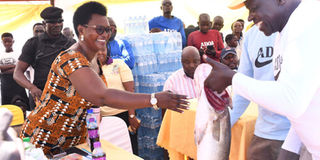Govt to start restoring Lake Kyoga buffer zones

Fisherman gift the Minister of State for Fisheries, Ms Ms Hellen Adoa, with Nile Perch during a community Barraza at Kyere Sub-county in Serere District at the weekend. PHOTO/SIMON PETER EMWAMU
What you need to know:
Human activities around the lake have destroyed vegetation that once covered most of the lake shores.
The government through the Ministry of Agriculture, Animal Industry and Fisheries has announced plans to start planting vegetation cover on the shores of Lake Kyoga.
The move aims at protecting the buffer zones of the water body.
Mr Paul Bwire Omanyi, the assistant commissioner of fish quality assurance at the line ministry, told the people of Serere District that human activities had destroyed marshes that once covered most of the lake shores.
“To ensure that the lake bed is safeguarded from effects of soil spilling into it, and affecting the breeding of fish, the government will with effect from next year start to plant vegetation on the shores of Lake Kyoga,” Mr Omanyi said.
He made the remarks during a community barraza organised by the Minister of State for Fisheries, Ms Hellen Adoa, in Lira District at the weekend.
He added that in the plan to green the lake shores, the government through the climate-smart agriculture project is going to dig 1,000 fish ponds across the country not only to lessen the burden on Lake Kyoga, but also to enable the people in various groups to generate income.

Mr Charles Oberu, the principal fisheries officer, said climate-smart agriculture is going to heavily benefit the people of Serere.
‘‘Several fish farmers are being supported with both fingerlings and fish feeds,’’ he said.
Mr Oberu added that once the Ojama Valley Dam is completed, the ministry will stock it with fish fingerlings.
It has been established that swamps offer the best environment for fish farming, according to the ministry officials.
“As the ministry, it is our prayer that farmers form groups so that they are given support to start fish farming,” Mr Oberu said.
Mr Frederick Okello, a fish farmer, said poor quality feeds on the market have demoralised their efforts.
“Fish requires a lot of protein for proper growth, but the feeds being sold on the market are of low protein content,” Mr Okello said.
Lucrative venture
Ms Hellen Adoa, the Minister of State for Fisheries, said fish farming remains one of the lucrative projects that will empower families financially.
““We decided to move with technical officers from the Agriculture ministry to educate people on aspects of conservation and fish farming,’’ she said.
Ms Adoa added that President Museveni is passionate about fish farming and wants to see that the fish industry grows and generates more revenue for the government.




